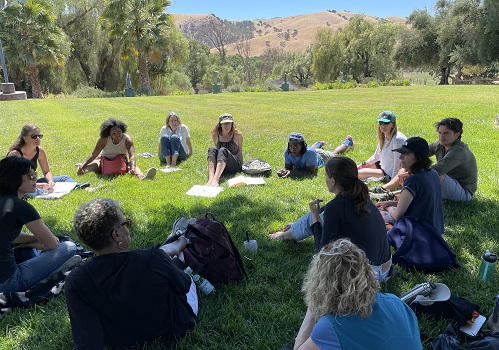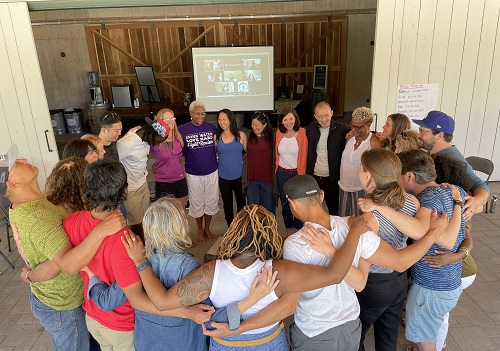Most activists sense the dense web of connections linking social, economic and climate justice, yet stick largely to their own anchor points. What if everyone ventured out a little farther, weaving together multiple strands of difference—class, race, culture, age and more? What if we illuminated the threads not just to reveal the architecture of problems, but also to outline a vision of the world we want to create? What if we invited everyone in and widened the circles of activism?
“We need to take big leaps of faith,” says Just Economy Institute (JEI) faculty member and leadership expert Akaya Windwood. “There are enough of us now doing this work. I think we have everything we need in order to make transformation happen.”
We just need to activate the connections.
As leaders of the JEI, which educates and supports financial activists, we see a rising desire to integrate social justice with climate justice work and bring a broader range of people into interwoven movements—impulses reflecting the realization that systemic change requires breaking out of silos.
To explore what it takes to succeed at this vital intersectional work, we interviewed three members of the JEI community who are already doing it: Windwood, lead advisor for Third Act and founder of the New Universal Wisdom and Leadership Institute; Tzeporah Berman, international program director at Stand.earth; and Stephone Coward, economic justice director at the Hip Hop Caucus.
All three focus on shifting the flow of money to fuel positive change, creating accessible opportunities for people who have felt powerless, and working across differences to support diverse activist communities. Here are their insights on how to pull multiple worlds together to build a durable and growing force for progress.
Make Money’s Role Visible
Many Fellows who came to the Just Economy Institute with a strong social justice focus believed that focusing on money is bad and the people who work with money usually can’t be trusted, so they’ve disassociated from it. What they find, though, is that tracing the flow of money reveals hidden leverage points and shifting that flow can accelerate positive change.
“There’s an opportunity to lean more into the power that people have through their money—even if they don’t have a great portfolio—to send a message that we can’t prioritize profit over people,” says Coward.
To that end, Coward recently launched Bank Black and Green, a multiyear campaign to rally impact investors to shift capital to Black-owned banks that pledge not to finance the fossil fuel industry or mass incarceration. The campaign reflects an analysis of how the flow of money shapes the Gulf South, and how that flow can be positively redirected.
“These minority depository institutions are frontline actors in a just transition from the current extractive economy to a regenerative one,” Coward says. Meanwhile, “fossil fuel companies come into underdeveloped communities with the promise of good jobs and actually end up poisoning these communities, lowering the value of homes and local businesses, and driving away other forms of economic investment.”
Third Act, which engages older Americans in climate action, also aims to shift the flow of capital by activating investors and depositors. Its campaigns include “move your money” initiatives, shareholder advocacy, and in-person direct actions. In addition to targeting “big, dirty banks financing the climate crisis,” Third Act finds less obvious places to apply pressure: A multipronged campaign, for example, focuses on getting member-sensitive Costco to clean up its credit card.
Meet People Where They Are—Literally and Figuratively
“We need to bring the organizing away from the centers of power and into the centers of impact, where climate change is already hitting hard,” says Coward. “New York, D.C., L.A.—places like that are important, but the people who live in the Gulf states also want and need to be a part of this work. We have to build power and mobilize people in the South.”
That requires a long-term commitment, he adds—not just “parachuting into communities to do some type of vanity project and then leaving. And in order for us to do this financial activism and climate activism work together, we’ve got to understand where people are currently.”
This is true in every dimension of difference. “It’s been eye opening to me to understand that we are having two very different conversations generationally,” Windwood said, “and I’m coming to the understanding that cross-generational work is as essential as working across race, gender and class—and perhaps more salient now than anything else. The world that my generation grew up in is very different from the world that Gen Z is inheriting. And unless we can talk about that, and talk about it in ways that allow everyone to hear each other, we’re going to miss a huge opportunity to create an optimistic narrative about possible futures.”
One impediment to such conversations is communication habits that mimic the power dynamics of the systems activists are trying to reinvent.
“One of the most toxic patterns in our social movements is the critiquing that we do, the contest to see who’s the smartest person in the room—and the way I can tell you that I’m the smartest person in the room is by tearing down your ideas,” Windwood said. “If we’re actually going to change things, we need to start finding honest common ground. Imagine going to a social justice gathering where everybody is looking for what’s best in everybody else. Where we are welcoming and kind, and can disagree with some grace. We can say the hardest things if we’re kind. The word kind is related to kin. And we’re related to each other. Remember that.”
Do the Work to Work Across Difference
We can also do hard things—and if we’re going to create the mass movement needed to bring about climate and social justice, we need to take on the painstaking work required to engage people across cultural, racial, class, age and other axes of difference.
Absolutely critical to working across differences is exercising the listening muscle: “We have got to learn how to listen—listen to understand, not to respond,” says Berman, whose organization builds power side-by-side with the frontline communities most impacted by environmental crises.
“There is an inherent tension in the work we do, because when you work on environmental and climate issues, you always feel like you’re racing against the clock,” she says. “Yet true justice-based relationships that are not extractive take trust, and trust takes time.”
Building trust—especially with frontline communities—starts with the approach to developing the campaign, she adds: The most effective actions involve co-creating the strategy, not just giving people the opportunity to have a voice in it. Berman offers Stand.earth’s Amazon campaign as an example.
“I was invited to go to Ecuador, to the heart of the Amazon, and spend time with some of the Indigenous communities that are impacted by oil drilling. We built a resistance strategy jointly with Indigenous associations and leadership. And when we decided to try to convince banks to stop funding oil drilling in the heart of the Amazon, we weren’t just facilitating Indigenous leaders to do a speech to a bank,” Berman said.
“Instead, our researchers briefed them on all the financial information and answered their questions so that when the Indigenous leaders showed up in a meeting with vice presidents of some of the largest banks in the world, they were negotiating with real information, and they were equal partners. Those bank executives were hearing not just the story of impacts on the land and in the forest, but an assessment of their recent financial transactions in the oil trade and a direct request to stop this contract and no longer pursue this particular company. They didn’t expect that.”
As a result of the campaign, she says, banks have moved billions of dollars out of financing oil extraction in the Amazon.
Give People a Reason to Act—and Know That It Isn’t Facts
Facts, at least facts alone, don’t motivate people to act. So what does move them to invest their time, money and social capital in activism?
“The research is showing us, and my own lived experience of running and designing advocacy campaigns for 30 years shows, that people are motivated by opportunity,” Berman says. “If I say to people, ‘The Global Fossil Fuel Nonproliferation Treaty is a huge new idea that is essential because we’re on track to build 110% more oil, gas and coal than we can ever burn and it’ll fry the planet,’ that will motivate very few people. The data shows us it’ll motivate less than 10% of the people.
“But if I say ‘Twelve nations have already endorsed, along with 3,000 scientists; momentum is growing and if we work together, we can convince five more countries to join this year, which will ensure we get a negotiating mandate at the U.N.,’ then I’ve communicated, ‘You are a part of the momentum. This thing is actually possible, but you need to engage.’ It’s the actually possible that motivates people to make change.”
Bring the Storytelling, the Hope and the Joy
Activism by its nature is focused on problems, and that can make the work feel grim to people who don’t do it for a living (and even to some who do).
“We need people to stay for the long term. Our hope must be louder than the other side’s grievances,” Coward says. “There is an opportunity here for us to use the power of storytelling to put out something aspirational, to talk about what a society that doesn’t prioritize profit over people looks like. What does a society where the banking industry has been changed for the good look like? What does it mean to invest in public health and safety? Of course, we’ll talk about the things that we’re divesting from, but I think that needs to come second to the things that we want to invest in.”
Windwood echoes the need for “stories that tell us of possible futures,” along with an experience of community. For instance, Third Act’s Rocking Chair Rebellion spurred older Americans across the country to flank the entrances of fossil fuel–funding big banks in their rockers, asking customers to move their money.
“I think that’s why Third Act is so effective, and how we went from an idea two years ago to having over 70,000 members today,” she says. “When we say, ‘Let’s go sit in front of the banks in our rocking chairs,’ people want to do that. Why? Because it’s fun.
“A lot of older people are very isolated,” she adds, “and this gives them a place to come together again, a place to make a difference. So it is about strategy, but mostly it’s about connection and kindness, and let’s do this together. People are signing up for that.”
Berman’s parting advice: “Find ways to experience joy together. It will do more to strengthen your work than anything else because joy is the justice we give ourselves in troubled times.”
Deb Nelson is executive director and Tina Beck is deputy director of the Just Economy Institute, which educates, supports, and connects financial activists who are shifting the flow of capital and power to solve social and environmental problems.


